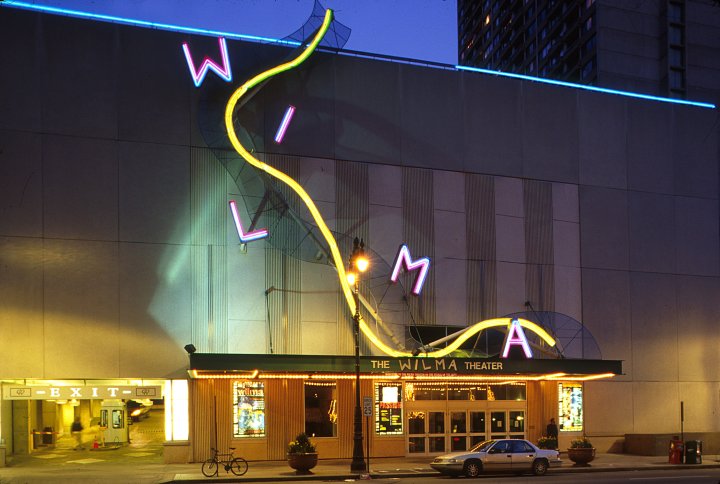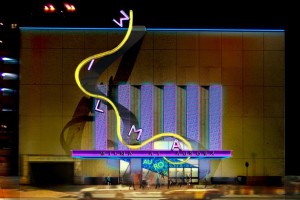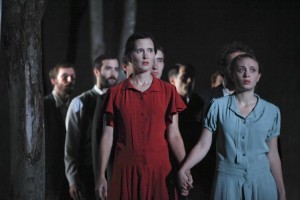
When the Wilma Theater moved into its home on South Broad Street in 1996, it marked the first construction of a theater from the ground up in Philadelphia since the 1920s. This physical landmark to the flowering of the city’s professional theater scene around the turn of the millennium was also an early step to the dream of Mayor Ed Rendell of Broad Street as an “Avenue of the Arts”. Inside the theater, there’s an impressive 300-seat playhouse, home to the Wilma and dance company BalletX. Outside… well: there’s a snaking, gaudily illuminated purple and yellow façade that has always felt unrepresentative of the fine performing arts inside.
On Monday night, premier playwright Tom Stoppard, whose work Arcadia opened the theater and whose latest play The Hard Problem opens at the Wilma on Wednesday, posited another interpretation of the dated namemark. To Stoppard, the sign perfectly fits the off-center vision of Wilma artistic director Blanka Zizka, for whom he gave an effusive, heartfelt introduction. Stoppard’s speech was a highlight of a packed-house gathering of media and supporters to announce a $10 million Transformation Fund Campaign, which will provide funds for an overhaul of the façade, a new cafe space, a boost to the endowment, and an evolution of the Wilma’s artistic mission.

Seed money of $5 million comes from the Wyncote Foundation, a charitable organization founded by scions of John C. Haas, who built a fortune with chemical manufacturer Rohm and Haas. (The Wilma is halfway to its goal of $5 million in matching funds.) The foundation’s gift will be celebrated by the addition of the words “at Aurora” in tinted glass on the lobby doors and on the main marquee, adding some color and perhaps more current design sensibilities to the façade, courtesy of designer Kristen Robinson. The new theater name remembers Chara Aurora Cooper Haas, the mother of the four brothers who make up the Wyncote Foundation board of directors.
In addition to the façade redesign and an $6-million endowment boost, the fund will be used to refit the theater’s lobby. The open space will be divided into two levels: a cafe on the ground floor with a performance liquor license and a “training and education studio” above.
The funds will also go towards revamping the programming inside the theater. According to Wilma artistic director Blanka Zizka, the Transformation Fund will offer resources for the recently piloted Wilma HotHouse resident acting company, allowing the theater to compensate and foster artists, hire international master trainers; and commission new projects.

HotHouse is part of an evolution in performance practice seen at the theater over the past several seasons, beginning with the outstanding 2011 production of Our Class. The Wilma’s evolving artistic vision includes a commitment to longer rehearsal times, collaborative creative practices, and physical-based theater—trends evident across Philadelphia’s theatrical landscape.
This resident artistic company includes a collaborative group of ten performers who meet each Monday to conduct workshops, explore texts, and further develop the Wilma’s movement-based aesthetic. All members are compensated annually by the Wilma, in addition to receiving union-scale actors’ salaries for each show or workshop in which they perform.
The HotHouse will allow the Wilma to conduct readings, intensive workshops, and other experiments with company members and guest artists. It will also allow the theater to develop new works specifically for its company of actors, in the vein of its 2014 devised work Don Juan Comes Home from Iraq. The first beneficiary of the Wilma’s new monies will be young playwright Kate Tarker. Just a year and a half after graduating from Yale, Tarker has been commissioned to create a new work on the HotHouse ensemble, a collaboration set to continue through 2018.
In introducing Zizka, Stoppard reminded those gathered at the Wilma of the strength and value of her idiosyncratic vision. Michael Halberstam, artistic director of Chicago’s Writers Theatre, built upon Stoppard’s comments. Calling Philadelphia “an amazing theater community … one that equals any of the great theater communities in the country,” Halberston praised Ziska as “a prize … beloved and respected by her colleagues across the nation.” Strong words indeed; it is certainly remarkable that one of the city’s top theaters so highly reflects the artistic vision of one woman.
That said, ten million dollars seems like a lot of money for a company with one of the biggests operating budget in the city, especially when so many smaller companies are struggling to survive—yet creating artistically enviable work—with so much less. So it’s pleasing to hear the Wilma’s vision includes outreach to the larger Philadelphia theater scene through a HotHouse Studio. The idea is that the Wilma’s physical theatrical aesthetic, honed through actor training, will then be disseminated to the wider Philadelphia community with classes offered through the HotHouse Studio. HotHouse actors will also spearhead educational residencies at underserved schools such as El Centro and Bartram High School.
Big news from the Wilma; we can only hope that the quality of the productions onstage will match the ambition off it.
At inception, the HotHouse company includes Ross Beschler, Taysha Canales, Sarah Gliko, Justin Jain, Jenn Kidwell, Jered McLenigan, Campbell Meaghan O’Hare, Steven Rishard, Lindsay Smiling, and Ed Swidey. Its associate artists include Krista Apple-Hodge, Keith Conallen, Kate Czajkowski, Zainab Jah, Forrest McClendon, Kevin Meehan, Dan Perelstein, Brian Ratcliffe, Matt Saunders, and Thom Weaver. Its membership will be determined annually at the discretion of Blanka Zizka.

Edited to use Michael Halberstam’s exact wording in his praise for Blanka and Philadelphia theater